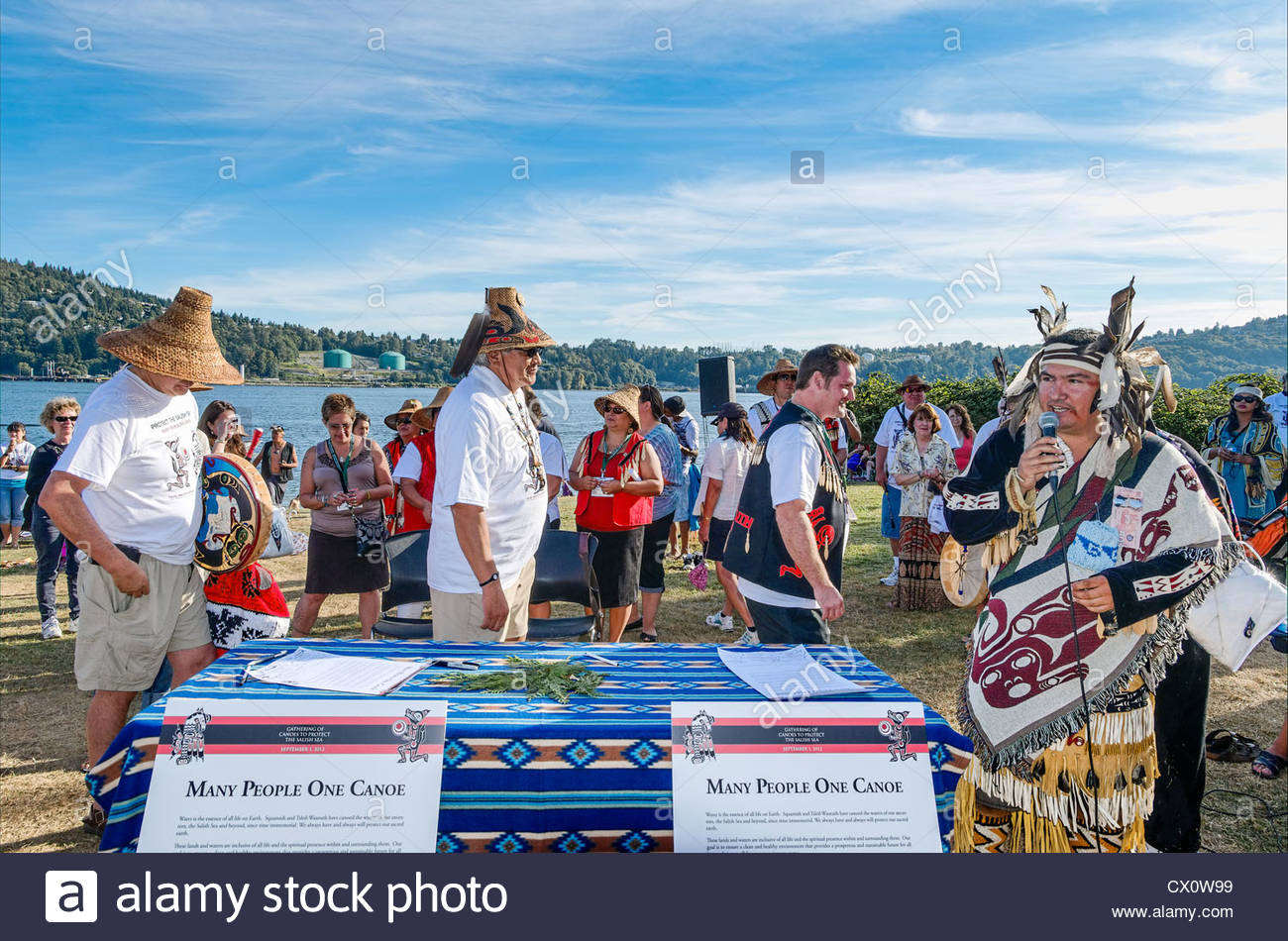2.6 Ethnocentrism in Perceptions Towards Salish Knowledge
5] “To raise the question of ‘authenticity’ is to challenge not only the narrative but also the ‘truth’ behind Salish ways of knowing “(Carlson 59). Explain why this is so according to Carlson, and explain why it is important to recognize this point.
When people embedded with norms from Western culture question the authenticity of Salish ways of knowing, this is an ethnocentric manner of challenging Salish trustworthiness in representing knowledge. We, who have been socialized within Western culture–whether Canadian or American–have been taught over and over that scientific knowledge, rationality, and written knowledge are the most legitimate ways of finding and telling knowledge. However, these ways are not the only accurate methods of describing knowledge… It is important to recognize and break apart assumptions that Salish knowledge and beliefs are less accurate or tied to reality that Western ones, because these assumptions lie in beliefs of the superiority of our culture’s way of doing things. They are biases created by ethnocentrism, and so widespread and embedded into our system of schooling, knowledge-creation, academia, etc. that it’s easy to interpret these biases as truth. However, Salish knowledge should be learned from and interpreted as just as legitimate regardless if their ways of telling their stories are different from Western ways.
Authenticness is seen as stories created before contact, stories unaffected by the arrival and continued stay of settlers. Academia has more interest in pre-contact culture than post-contact culture, especially the “myths” and “legends” of indigenous culture. However, it is harmful to associate aboriginal culture with a skewed view of pre-contact culture created through misunderstandings and an idealized reality formed by settlers. Pre-contact stories were misunderstood and not taken as history, but as beliefs in fantasy. Furthermore, post-contact stories should be just as important because current aboriginal culture is just as relevant, important, and “cultural”.
To bring up the question of “authenticity” of post-colonial Salish is insulting and diminishing. Indigenous people pass experiential knowledge and viewpoints through oral tradition in a way that is taken as much seriously, if not more than written academia. “There are no authentic or inauthentic swoxwiyam, only better remembered/conveyed or less well remembered/conveyed swoxwiyam. There are no authentic or inauthentic sqwelqwel, only more or less reliable sources of historical information” (Robinson, 57). In the Salish world, historical accuracy and telling stories accurately is extremely important. “The Salish conveyors of poor history, like their Western counterparts, face various sanctions for sloppiness and transgression. It is unlikely… that they will be called in the future to share their stories in a public forum, and moreover they will acquire reputations as poor historians: their status will diminish.” (Robinson, 57) Conveying stories inaccurately, leaving out parts, or changing details harms the reputation and respect of families in Salish culture. To bring up the question of authenticity is disrespectful because doing so questions the trustworthiness of storytellers despite the high regard storytellers have for conveying their history accurately. Furthermore, it shows ignorance of Salish culture, and distrust in Salish people’s ability to tell their own experiences and culture’s history.
It is problematic to question the authenticity of Salish ways of knowing, whether in academia, media, or on the broader level of Canada’s culture, society, and beliefs because doing so takes away power from Salish people, making it harder for them to be taken seriously when they talk about themselves, their experiences, or argue for their rights; questioning their authenticity is questioning their legitimacy and trustworthiness. This prevents their stories about themselves and their own history from being listened to. As a result, they have less power to fight for themselves. Nevertheless, academics try to write about Aboriginals and describe their stories, but these are often different, lacking, affected by biases, or skewed. No one should have more power and legitimacy in describing the truth of Salish people than Salish people themselves, because this takes away their ability to be represented properly to others, and to control their own representation.
Asmi, R. E. (n.d.). Indigenous Representation in the Media and the Importance of Personal Narrative. Retrieved from https://scholarworks.umt.edu/cgi/viewcontent.cgi?article=1186&context=utpp
Carlson, Keith Thor Orality and Literacy-. Ed. Carlson, Kristina Fagna, & Natalia Khamemko-Frieson. Toronto: Uof Toronto P, 2011. 43-72.

Hello!
I really liked the way you pointed out that post-contact Indigenous stories are just as important as pre-contact. My question for you is how do you think different people telling the same stories differently affects how history is depicted? By this I mean the “telephone” game sort of idea, where as something gets told over and over through different people how the story can change over time. Do you think this changes the authenticity of the stories?
Hi Megan! Good question. Yes, I agree that different people telling the same stories differently would generally affect how a story is depicted, but I don’t think this changes the authenticity of stories when it come to Salish oratory. It was stated that it’s problematic to call accurate versus inaccurate storytelling based on the label of authenticity. If by authenticity, you mean accuracy of describing it like it was first told, it may not be described in exactly the same way with the exact same voice, however according to Robinson, conveying stories inaccurately, leaving out parts, or changing parts of the story harm the reputation of the storyteller and their family, making them less trusted by the community. They are much more careful not to make mistakes, and those that do are not trusted.
Hi Gaby,
I noticed that you discussed the authenticity of Salish knowledge and that it is problematic to question said authenticity. I was wondering why you believe that this is taking away the agency of the Salish stories. I understand that systematic and academic degrading of knowledge is very problematic but, to play the devil’s advocate, why are indigenous stories and Salish stories above criticism and questioning as opposed to European stories?